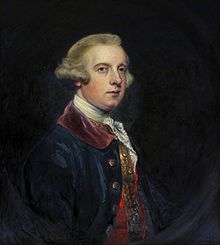Lord John Cavendish
|
The Right Honourable Lord John Cavendish |
|
|---|---|
 |
|
| Chancellor of the Exchequer | |
|
In office 27 March 1782 – 10 July 1782 |
|
| Monarch | George III |
| Prime Minister | The Marquess of Rockingham |
| Preceded by | Lord North |
| Succeeded by | William Pitt the Younger |
|
In office 2 April 1783 – 19 December 1783 |
|
| Monarch | George III |
| Prime Minister | The Duke of Portland |
| Preceded by | William Pitt the Younger |
| Succeeded by | William Pitt the Younger |
| Personal details | |
| Born | 22 October 1732 |
| Died | 18 December 1796 (aged 64) |
| Nationality | British |
| Political party | Whig |
Lord John Cavendish PC (22 October 1732 – 18 December 1796) was a British nobleman and politician.
Cavendish was the youngest son of William Cavendish, 3rd Duke of Devonshire, and his wife Catherine, daughter of John Hoskins. Prime Minister William Cavendish, 4th Duke of Devonshire, Lord George Cavendish and Field Marshal Lord Frederick Cavendish were his elder brothers. He was educated at Newcome's School in Hackney and at Peterhouse, Cambridge.
He served as Chancellor of the Exchequer in 1782 and 1783, and was sworn of the Privy Council in 1782. He was a supporter of Lord Rockingham, and subsequently of the Fox-North Coalition that brought the Duke of Portland to power. He lost his seat in the election of 1784, when the coalition fell, and did not return to the House of Commons until 1794, in the family seat of Derbyshire.
Cavendish died in December 1796, aged 64.
Cavendish's friend Edmund Burke penned several eulogies of him after his death: "The world never produced a more upright and honourable mind; with very considerable talents, and a still more considerable improvement of them".
...
Wikipedia
